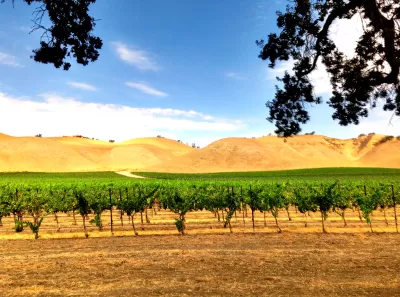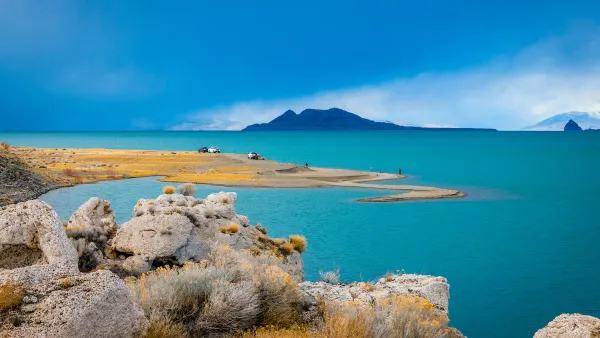Paso Robles -- one of California's premier wine-producing regions -- is on the verge of running out of water, pitting wine producers against rural residents. At stake is the possible future of the region.

The Paso Robles region of California has development a global reputation for its wines, thanks in great part to the hot weather and soil conditions which are remarkably similar to the famous grape-growing Rhone region in France. The wine making industry contributes to California Central Coast's $1.2-billion local tourism industry.
"This surge in popularity has caused wine grape acreage in the county to more than triple in 15 years to 36,550 acres — and there are estimates of up to 8,000 acres more being prepared. With little to no rain on much of that land, drip irrigation is widespread." But demand for water to support the additional growing has reached a critical point, and exceeded the ability of the region's aquifer.
"On one side are wine producers, who feel besieged and undeserving of all the blame. On the other are rural residents, who worry over their housing values and ask how soon before their faucets cough dust?"
A recent editorial in the Santa Maria Times sums up the issue:
"Despite the fact that vineyards require only a fraction of the water used to grow some other crops, non-farming residents in and around Paso Robles are going to the mat with grape growers. Legal action is a distinct possibility, and the water-use question has been tossed into the lap of the [San Luis Obispo] County Board of Supervisors, whose members, frankly, don't know which way to turn. Growers have made proposals to help ease tensions -- without success -- including connecting to the State Water Project, so groundwater use on crops can be reduced. The problem with that strategy is climate change is supposed to significantly reduce rainfall and snowmelt in the coming years, which would effectively reduce the amount of water the state system could deliver."
A five-part series by the San Luis Obispo Tribune earlier this year outlines the stakes:
"Deep beneath the peaceful countryside, the North County’s primary water source is facing an unprecedented crisis... Over the past 30 years, levels in the underground aquifer have dropped precipitously, 80 to 100 feet or more in some areas. These declines pose a profound threat for the region, residents and economy. Rural homeowners are facing the prospect of losing their homes because their wells are going dry. Vineyards could lose access to a crucial resource. And the crisis in the groundwater basin is only expected to get worse — much worse."
FULL STORY: In Paso Robles, vineyards' thirst pits growers against residents

Planetizen Federal Action Tracker
A weekly monitor of how Trump’s orders and actions are impacting planners and planning in America.

Restaurant Patios Were a Pandemic Win — Why Were They so Hard to Keep?
Social distancing requirements and changes in travel patterns prompted cities to pilot new uses for street and sidewalk space. Then it got complicated.

Map: Where Senate Republicans Want to Sell Your Public Lands
For public land advocates, the Senate Republicans’ proposal to sell millions of acres of public land in the West is “the biggest fight of their careers.”

Orange County, Florida Adopts Largest US “Sprawl Repair” Code
The ‘Orange Code’ seeks to rectify decades of sprawl-inducing, car-oriented development.

Maui's Vacation Rental Debate Turns Ugly
Verbal attacks, misinformation campaigns and fistfights plague a high-stakes debate to convert thousands of vacation rentals into long-term housing.

San Francisco Suspends Traffic Calming Amidst Record Deaths
Citing “a challenging fiscal landscape,” the city will cease the program on the heels of 42 traffic deaths, including 24 pedestrians.
Urban Design for Planners 1: Software Tools
This six-course series explores essential urban design concepts using open source software and equips planners with the tools they need to participate fully in the urban design process.
Planning for Universal Design
Learn the tools for implementing Universal Design in planning regulations.
Heyer Gruel & Associates PA
JM Goldson LLC
Custer County Colorado
City of Camden Redevelopment Agency
City of Astoria
Transportation Research & Education Center (TREC) at Portland State University
Camden Redevelopment Agency
City of Claremont
Municipality of Princeton (NJ)





























